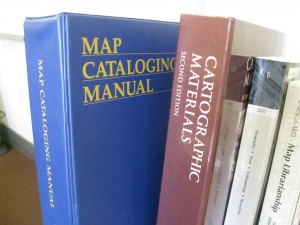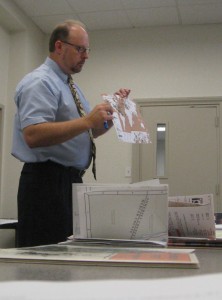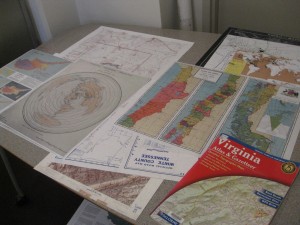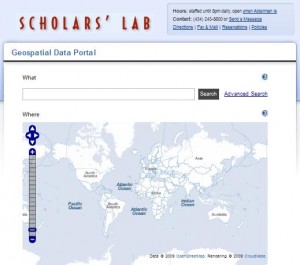It’s a quiz. I’ll name the required skills, you name the profession. Go.
-
Identifying map projections and coordinate systems
-
Interpreting map scale
-
Understanding techniques of cartographic relief
-
Interpolating latitude & longitude
-
Calculating geographic extent rectangles
Too easy? Well the profession I’m describing is not Geographic Information Systems guru or Cartographer or Neogeographer. In fact, my list describes just a few of the skills you’ll need to be a first-rate Map Cataloger.
Thanks to a thoughtful invitation from Jennifer Roper, I learned a bit about map cataloging alongside her UVA Library Cataloging and Metadata Services team at a workshop led by one of the very best, Paige Andrew of Penn State University. Of course Mr. Andrew sports a world map necktie.
The session made clear to me many of the skills needed to be a strong map cataloger are the same skills needed to be proficient in Geographic Information Systems. That skills list above would serve as a good starting outline for a GIS 101 syllabus and all those skills are key to the map cataloging workflow.
And Mr. Andrew’s traveling map collection was a treat to explore with examples of bleeding edge maps, segmented maps, pop-up maps, remote sensing maps, tourist maps, and maps with and without covers and neatlines. Who knew map catalogers must be skilled in both map unfolding for preservation and map re-folding (harder!) for panel measurements.
Today was eye-opening for me in thinking about using a geographic search to discover paper maps in a library catalog. With catalogers now capturing the latitude and longitude of each corner of the map as part of their workflow, finding every paper map that intersects any point on the earth becomes possible. It’s sometimes called searching by geographic extent. Just point to any spot on a map of the world and find all the maps in the collection that cover that spot.
Geographic search relies on the kind of extent rectangle metadata map catalogers now create every day. We’ve implemented geographic search for digital datasets in our GIS Portal http://gis.lib.virginia.edu by creating just such extent rectangle metadata for every digital dataset.
Seems map catalogers are setting the stage for that same kind of discovery for paper map collections. Paper maps are getting smarter every day.




